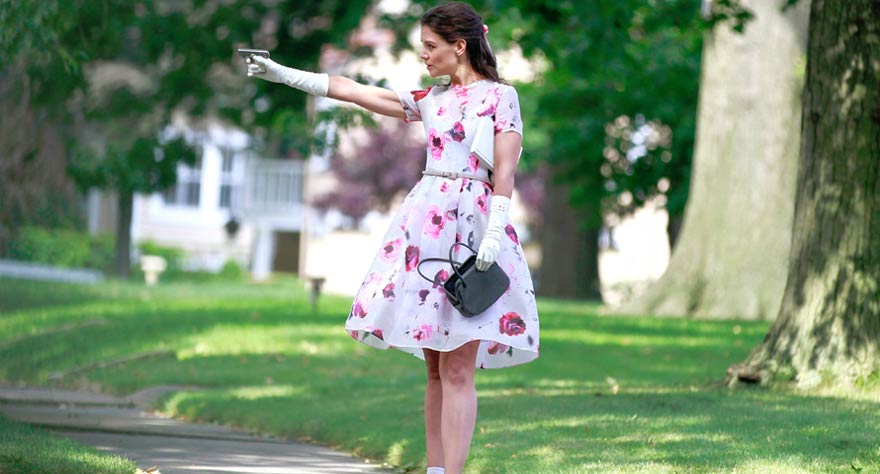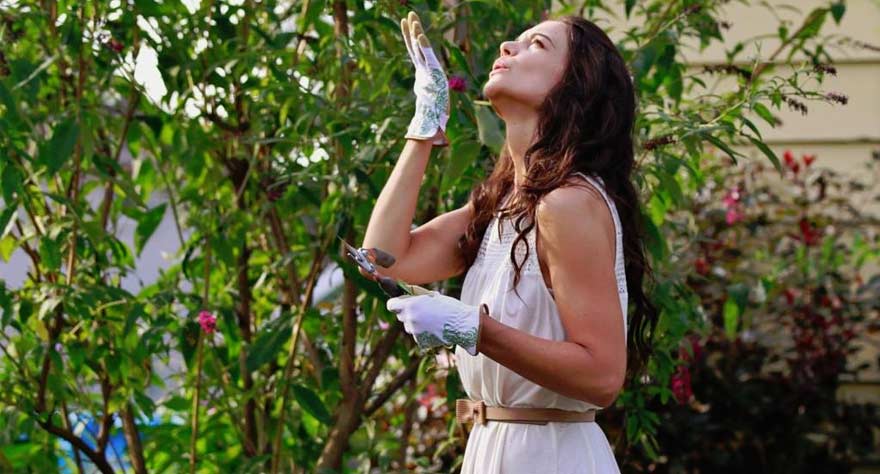
A tap-dancing, handgun wielding, substitute teacher takes on neighborhood safety.

A tap-dancing, handgun wielding, substitute teacher takes on neighborhood safety.
When, at the beginning of Miss Meadows, Katie Holmes as the titular character begins to tap dance while walking down a residential sidewalk while blowing kisses at watching birds, grazing deer, and curious squirrels it seems obvious just how silly this dark comedy is going to let itself get. And when a man pulls up next to her in a pickup truck telling her how pretty she looks before subsequently pulling out a gun and demanding she gets in the car, the extent of the film’s dark side is pretty obvious as well. But the extreme space between the silly and the serious is what unravels this schizophrenic film ultimately.
Miss Meadows is prim and proper, never leaves home without her tap shoes on and a book to read, she spends her free time gardening and works as a substitute teacher imbuing her positivity to young children. And when she encounters anyone with bad intentions, she becomes an angry vigilante, pulling out her tiny silver handgun from her purse and swiftly issuing her own form of justice. How she manages to encounter so much evil on a regular basis is a bit questionable, but more questionable is how her vigilantism seems almost always to be invoked in the heat of the moment, too un-meditated, and thus seemingly quite sloppy as far as crimes go. When she meets the local Sheriff (James Badge Dale) and finds he too is devoted to seeing the bad guys get theirs, she’s naturally quite attracted. Of course, their methods are invariably at odds with each other and romantic bliss is disrupted as the Sheriff grows more curious about his new girlfriend.
With cutesy dialog (Miss Meadows loves speaking in etiquette rhymes and says too-da-loo after every interaction), especially between Miss Meadows and her mother (Jean Smart) who are often on the phone with each other, the film can be tedious to endure. Somehow Holmes’s sweetness never seems genuine, and not just because she occasionally pulls out a gun and shoots people, but because writer/director Karen Leigh Hopkins tries to fully explain Miss Meadows darker inclinations as a result of a childhood trauma while giving her impassioned speeches of political reasoning behind her actions that seem almost sensible. She’s not fully sweet and she’s not fully psychotic, therefore she’s not fully interesting.

Some of the best scenes are between Miss Meadows and her students, portraying her as a terrific teacher and mother figure. The chemistry between Holmes and Dale is middling. Neither of them seem particularly to blame. Mid-way through the film when a sinister figure (Callan Mulvey) appears in Miss Meadows neighborhood and she takes it upon herself to warn him not to try anything foolish, the film seems like it might take a darker (and more interesting) turn, but the rest of the plot plays into expectations leading to a rather inevitable conclusion (though with an unnecessary and confusing epilogue that undoes some of the characters’ development.)
Having mostly written for TV movies, Hopkins gives off the impression she never intended for Miss Meadows to be truly dark, there’s too much safety written into the script. But Hopkins hangs out in too much middle ground. Her darkness isn’t dark enough, her humor isn’t funny enough. Even a twist in the third act doesn’t seem all that surprising. Katie Holmes can play it, but the writing isn’t strong enough to give her anything fun to run with.
Miss Meadows is the sort of psychopath you wouldn’t want as a neighbor. Not because she is creepy, but because her by the book manners and Snow White demeanor are so grating, exchanging pleasantries would be downright tedious. As far as friendly neighborhood sociopaths go, I’ll take Dexter Morgan over Miss Meadows any day.
Miss Meadows is now available to stream on VOD.